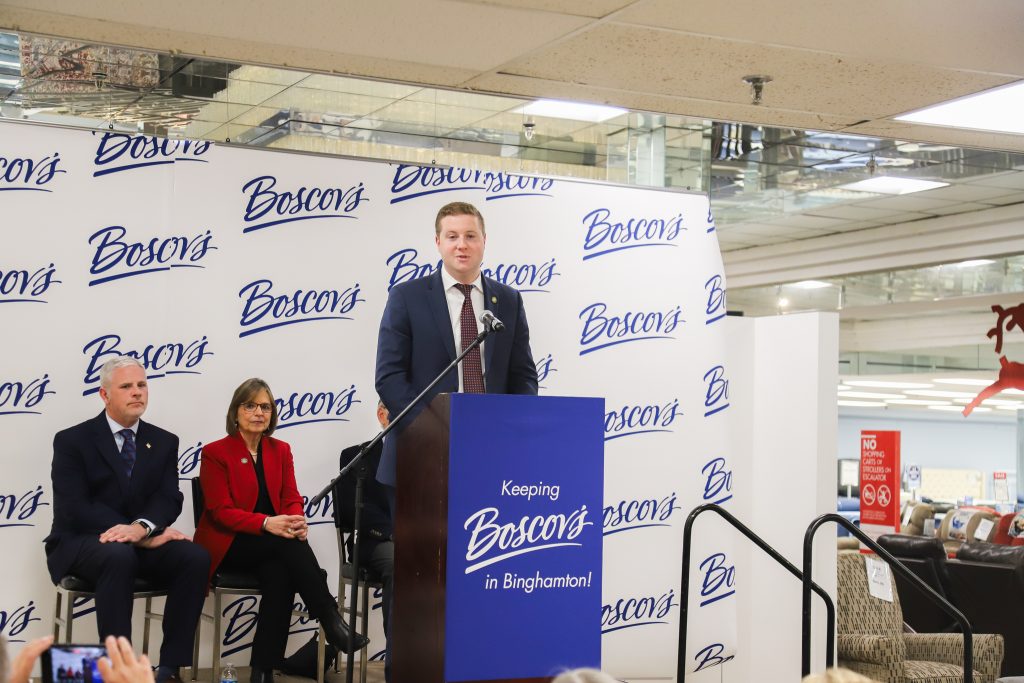Elected leaders and Boscov’s Chairman and CEO Jim Boscov came together to announce a 10-year lease extension and $10 million in upgrades for the historic Court Street Boscov’s.
At the press conference, held on Nov. 20 on the fourth floor of the Boscov’s store, speakers including Binghamton Mayor Jared Kraham, New York State Assemblywoman Donna Lupardo and Broome County Executive Jason Garnar discussed the planned lease extension and renovations. Funding for the project comes from a $5 million grant from the New York State Assembly, $2.5 million from the City of Binghamton and $1 million from Broome County. Financial support from the city and county came from the American Rescue Plan Act (ARPA), an economic stimulus package passed by the U.S. Congress during COVID-19.
Joe Burns, a Democratic city councilman, was also in attendance at the announcement.
In a press release from his office, Kraham described Boscov’s benefits to the city.
“We are keeping Boscov’s in Downtown Binghamton for the next decade and facilitating much-needed upgrades to this historic, publicly-owned building,” Kraham said. “By leveraging a significant state grant, we are supporting the future of a major Downtown destination that brings visitors from across the region to Binghamton each year. As importantly, we are retaining jobs and critical sales tax revenue.”
Planned renovations include upgrades to the building’s electrical and plumbing infrastructure, heating, ventilation and air conditioning (HVAC), elevators, structural repairs and investments in clean energy sources. The five-story, 240,000-square-foot building was built in the late 1800s, and Boscov’s has operated within the structure since 1984.
Lupardo, a key figure in securing the state funding, expanded on Boscov’s significance — saying that it was one of the last Downtown department stores in the United States — and expressed her gratitude to those involved with the project.
“People who come here and are really just nostalgic for stores like this,” Lupardo said. “We are very, very lucky that we have it here. I also want to tell you how happy I am to see the city, the county and the state all coming together to collaborate on saving this historic property.”
The Boscov’s project is the latest city initiative to use ARPA funding since the federal government passed the legislation in 2021. Previous projects have included a planned $40 million affordable housing project on Clinton Street, announced by Kraham in September. Pending City Council approval, $2.2 million in funding for the project was to come from ARPA money allocated to the city.
In October 2021, former Mayor Rich David used $2 million in ARPA funds in a planned renovation of various deteriorated properties throughout the city.
Aviva Friedman ‘14, a Working Families councilwoman representing the fourth City Council district, questioned if the project was a proper use of ARPA funds.
“While I’m grateful for the opportunity to preserve this historic Downtown building, I do not believe that this is the best use of this funding stream,” Friedman wrote in an email. “Despite the fact that the ARPA usage guidelines have loosened, I have been staunch in maintaining that ARPA funding should be used for its original intent — [COVID-19] relief. [COVID-19] shined a light on [a myriad of] societal inadequacies that could be addressed with this once-in-a-lifetime funding, such as housing, [health care] or direct support to essential workers.”
Other projects the city has used ARPA funds for include a $1 million youth fund established in September 2022. In September, $150,000 was allocated from that youth fund to the Astor D. Rice Foundation to create the Families Achieve Community Empowerment program for students and families at Binghamton East Middle School. Other initiatives included $500,000 being issued from the youth for local organizations such as the Binghamton Boys & Girls Club, Lourdes Youth Services and the Street Addiction Institute.
Andrew Poirier, a first-year master’s student in the teaching, learning, and educational leadership (TLEL) program, said bolstering Binghamton’s business scene was good policy.
“Any effort to revitalize Binghamton is always a welcome one,” Poirier said. “I think these renovations will draw more people Downtown, in turn helping other businesses on Court Street too.”
Friedman added that preventing Boscov’s from leaving the building was an important city goal, which she backed in City Council votes.
“I generally feel that this decision will have a positive impact on the City of Binghamton,” Friedman wrote. “I am a Boscov’s shopper myself, and it is valuable to have a conveniently located department store in Downtown Binghamton. I am thrilled that we will be able to perform much-needed repairs on the historic Downtown building. The city has been awarding Boscov’s [payment in lieu of taxes (PILOT)] agreements for the past few years, which I have supported in order to prevent the building from becoming vacant.”



